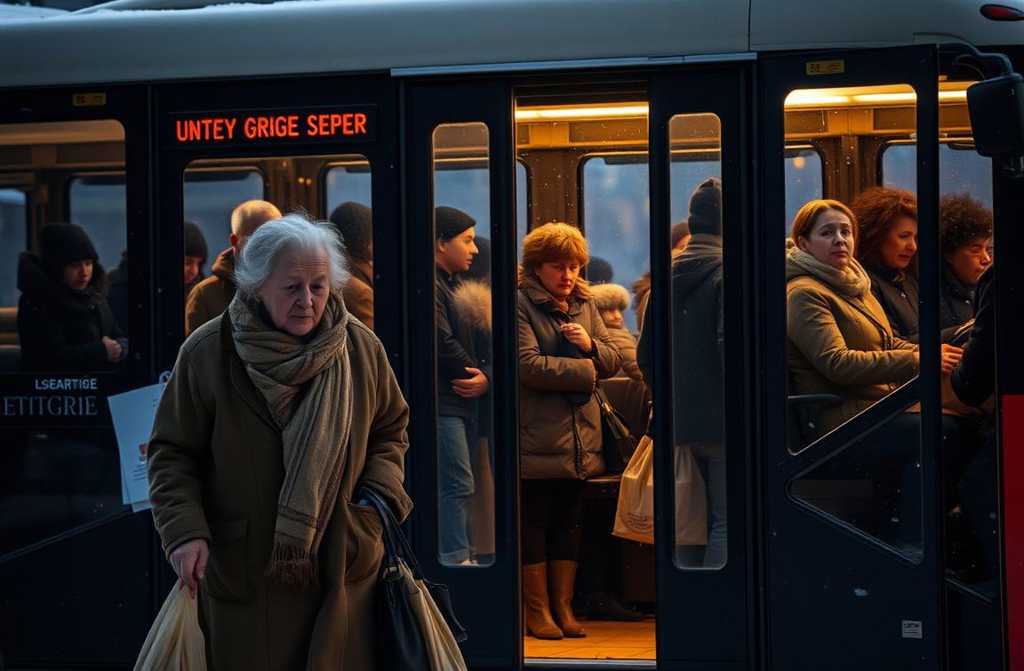The bus driver told off an eighty-year-old woman for not having a ticket. She answered with just a few words.
“Madam, you havent paid. Youll have to step off,” the driver said sharply, eyeing the frail woman in her threadbare coat, her knuckles white as she gripped the handrail to keep her balance.
The bus was almost empty. Outside, a damp sleet fell lazily, and the dim glow of streetlights barely pierced the evening gloom. She didnt arguejust clutched her worn-out shopping bag, the kind youd see in any high street supermarket.
“I said off! This isnt a charity bus!” the driver snapped, raising his voice.
The bus fell still. A few passengers looked away, suddenly very interested in their shoes. A young woman by the window chewed her lip. A bloke in a dark overcoat scowled but stayed put.
The old woman shuffled toward the exit, each step an effort. The doors wheezed open, and a bitter wind slapped her face. She paused on the step, turning to fix the driver with a steady look.
Then she spokesoftly, but clear as a bell:
“I raised lads like you once. With love. And now I cant even sit down.”
With that, she stepped off and walked away.
The bus stayed where it was, doors gaping. The driver turned, as if he could escape his own thoughts. Somewhere at the back, someone sniffled. The young woman wiped her eyes. The bloke in the overcoat stood abruptly and marched out. One by one, the passengers left, their tickets abandoned on the seats.
In minutes, the bus was empty. Only the driver remained, hunched in his seat, an unspoken *sorry* burning in his chest.
Meanwhile, the old woman trudged down the sleet-slicked pavement, her figure fading into the twilight, every step carrying a quiet sort of pride.
Next morning, the driver clocked in as usualsame early shift, same flask of tea, same route list. But something in him had shifted.
He couldnt shake the unease. Hed barely slept, haunted by her eyesnot cross, not wounded, just weary. And her words, ringing in his ears: *”I raised lads like you. With love.”*
As he drove his route, he found himself peering at every elderly face at the stops. He wanted to find her, though he wasnt sure what hed say. To apologise? To help? Just to admit he was ashamed?
A week passed.
One evening, near the end of his shift, he spotted a familiar shape at the stop by the old marketsmall, stooped. Same bag, same coat.
He pulled up, flung the doors open, and stepped out.
“Gran” he said quietly. “Im sorry. That day I was wrong.”
She looked up at him. Thenshe smiled. No bitterness. No blame.
“Life teaches us all, duck. The trick is to learn. And youve learned.”
He helped her onto the bus and sat her up front. Halfway through the ride, he pulled out his flask and offered her some tea. They rode in silencebut it was a good silence, warm and easy, like a shared secret.
After that, he always kept a few extra fares in his pocketfor those who couldnt pay. Especially the old dears.
Every morning before his shift, hed think of her words. They werent just a reminder of his mistakethey were a lesson in being decent.
Spring came overnight. The sleet vanished, and soon clusters of daffodils popped up at the stops, sold by grandmothers in woolly hats. He started recognising them, nodding hello, helping them aboard. Sometimes, just a smileand he saw how it lit them up.
But he never saw *that* particular grandmother again.
He looked for her every day. Asked around, described her. Someone reckoned she mightve lived past the railway bridge, near the churchyard. He even went there on his day offno uniform, no bus, just walking. Searching.
Then, one day, he found it: a simple wooden cross with a photo in a little oval frame. Those same eyes.
He stood there a long while, saying nothing. The trees rustled overhead, sunlight dappling through the leaves.
Next morning, a small bunch of daffodils sat on the front seat of his bus, picked by his own hand. Beside them, a handwritten sign on a bit of cardboard:
*”For those weve forgotten. Who never forgot us.”*
Passengers read it quietly. Some smiled. Some left a coin. And the driver just carried onslower now, more careful. Sometimes hed stop a tad early, letting an old dear catch up.
Because he understood now: Every grandmother was someones mum. Every smile was a thank-you. And sometimes, just a few words could change a blokes life.







